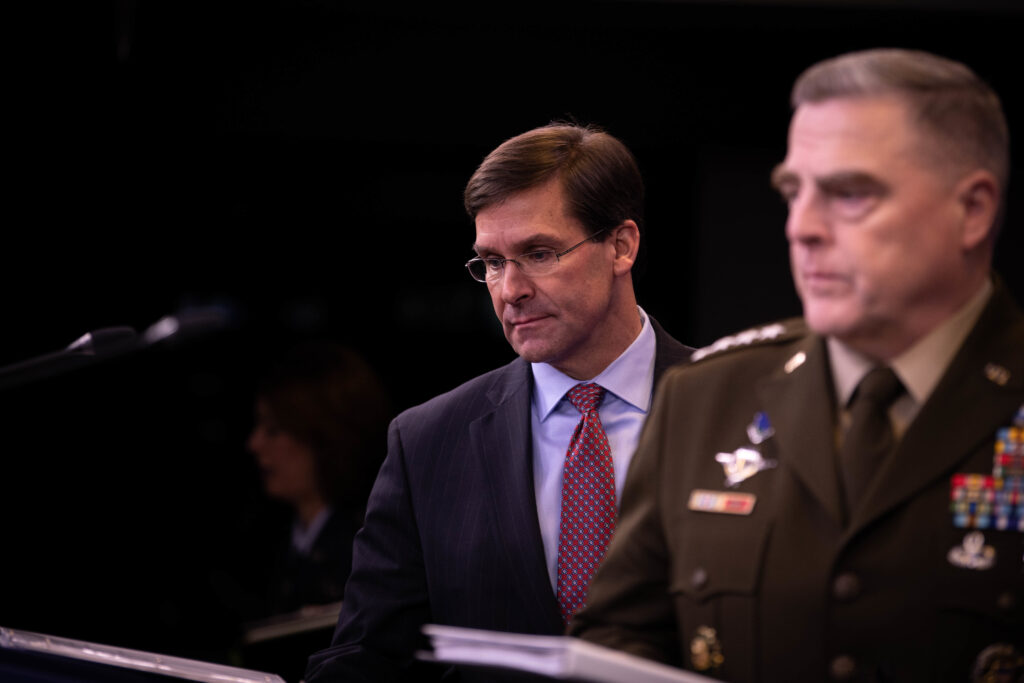 PENTAGON: In what appears to be a return to the Bush Doctrine, the United States will consider launching preemptive strikes on Iran to stop what it says are months of attacks on US forces and facilities in Iraq and the Middle East, Defense Secretary Mark Esper says.
PENTAGON: In what appears to be a return to the Bush Doctrine, the United States will consider launching preemptive strikes on Iran to stop what it says are months of attacks on US forces and facilities in Iraq and the Middle East, Defense Secretary Mark Esper says.
The warning came this morning during an off-camera meeting with reporters at the Pentagon, where Esper said there are indications Iran may be planning more attacks on the US and its interests in the region. “We will take preemptive action as well to protect American forces and protect American lives,” he said. “The game has changed, and we’re prepared to do what is necessary to defend our personnel and our interests and our partners in the region.”=
Lending weight to the secretary’s statement, Chairman of the Joint Chiefs Gen. Mark Milley appeared alongside and said Iran has been running “a sustained campaign at least since October,” targeting the US in the region. “We know that for certain. We know that the campaign has increased in tempo and intensity.”
Esper kept up the drumbeat by talking to MSNBC on camera after the briefing: “Enough is enough,” he said. “We have all the capabilities to either respond to further attacks or take preemptive action.”
The warnings come after a dizzying holiday week during whichthe US struck several positions of Kataib Hezbollah, an Iranian-backed militia the US accuses of conducting rocket attacks on the US base in Iraq. The strikes killed around 18 fighters and wounded another 50. Iraq’s government protested the strikes saying it objected to airstrikes on its territory which it had not agreed to.
The strikes led to a day-long assault on the US Embassy in Baghdad by KH supporters and militiamen, which the Iraqi military did little to staunch. The US flew 100 specially trained and equipped Marines in to defend the facility, and dispatched 750 paratroopers from the 82nd Airborne Division to Kuwait to backstop the Marines. Presumably, the paratroopers would be part of any strike team against Iran.
Milley said that an attack last month that killed a US civilian contractor at a base near Kirkuk was meant “to kill American soldiers, sailors, airmen and Marines …31 rockets aren’t designed as a warning shot. That’s designed to inflict damage and kill.” Esper added: There are some indications out there that they may be planning additional attacks. Do I think they may do something? Yes. And they will likely regret it.”
The latest drama in the Middle East comes two years after the Pentagon released its latest National Defense Strategy which sought to guide the department away from two decades of conflict in the region and sharpen the focus on peer competitors like China and Russia. But despite the desire the new strategy, which senior administration officials cite repeatedly whenever they appear on Capitol Hill, the Trump administration continues to struggle to extricate itself from the shadowy conflicts in Iraq, Syria and Afghanistan that have sucked in three presidential administrations dating back to the attacks of September 11, 2001.
President Trump ran for office pledging to end the “endless wars” in Iraq and Afghanistan, but has instead deployed almost 15,000 new troops to the Middle East since last May, along with new air wings and Patriot air defense systems to Saudi Arabia.
The deployments have drawn criticism from some former Trump administration officials who see little value in continuing to focus on Iran and its limited capabilities, while China is rushing ahead and pumping billions into high-end military programs such as two new aircraft carriers, dozens of highly-capable warships, long-range precision missiles, and fifth-generation fighter planes.
One of the principal authors of the National Defense Strategy, Elbridge Colby, sent a series of Tweets Dec. 31 criticizing the latest deployment to the Gulf region, writing the US has to make a choice between the Middle East and Asia. “It’s delusional to think we can do both at a high level of commitment and intensity. We must choose. And must choose Asia,” he wrote. “Washington must answer Iranian provocations in ways that limit US engagement in the region. If that means doing less than some might like, so be it.” Colby served as the Deputy Assistant Secretary of Defense for Strategy and Force Development until leaving the administration in 2018.
At the Reagan Defense Forum last month, Esper recognized that continuing problems in the Middle East are holding up the strategic shift to the Pacific, and admitted Washington is in a tough spot. “My ambition is and remains to look at how do we pull resources — resources being troops and equipment and you name it,” from places like Africa and the Persian Gulf to the Asia-Pacific. “That remains my ambition, but I have to deal with the world I have.”
No comments:
Post a Comment